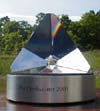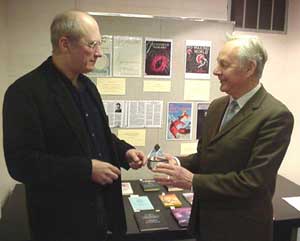
Olaf Stapledon: Winner of the First Annual Cordwainer Smith "Rediscovery" Award (2001)
Here is the award itself:
Stapledon scholar Robert Crossley accepting the award on behalf of the Stapledon family:
The Award Ceremony: Robert Silverberg's RemarksFifty years ago, when I was a teenage fan, a story called "Scanners Live in Vain" was published in an obscure and scruffy little science fiction magazine called Fantasy Books, and sent a shock wave through the world of science fiction, such as it was in 1950, a much smaller place. Nobody there had quite read a story as strange and wonderful as "Scanners Live in Vain," and the talk all year was, "Who wrote that story?" The byline was Cordwainer Smith... Nobody knew who Cordwainer Smith was. The story didn't get a Hugo, because Hugos hadn't been invented yet. Word came around that Cordwainer Smith was a pseudonym, but a pseudonym for whom? We didn't know, and it was not for many years that it turned out that Cordwainer Smith's real name was Paul Linebarger, that he was a mysterious man, a scholar, a diplomat, for all we knew a secret agent.... He had a really remarkable background in scholarship and espionage. Beginning in 1955 and continuing for a decade thereafter, he brought us a group of astoundingly original short stories and a couple of novels which marked the world of science fiction forever. The influence of Cordwainer Smith's stories has been incalculable. Well, he left us thirty-five years ago, but his memories and his stories remain with us. The great stories of Cordwainer Smith have been collected in a fine fat volume by the NESFA Press called The Rediscovery of Man. One of his great themes was that far in the future, after many changes in the nature of the human race, we would rediscover that which had led to the civilization of our future. The two daughters of Paul Linebarger, Rosana and Marcia, have created the Cordwainer Smith Foundation, to preserve the memory of their father and his work but also to further the ideals for which he stood, because he was a profoundly philosophical man who had many important things to say. And one activity of the new Cordwainer Smith Foundation is the Cordwainer Smith Rediscovery Award, which is designed to focus new light on an important science fiction or fantasy writer whose major work has in recent years fallen into undeserved obscurity. The Foundation found four judges to establish the award: John Clute, Scott Edelman, Gardner Dozois, and Robert Silverberg. We had a lively email discussion and arrived at a winner, and it developed after we had chosen our winner, that Paul Linebarger, when he was 19 years old, had written an essay on that writer's work. And I will read an extract from the term paper that he wrote at George Washington University:
Cordwainer Smith might almost have been talking about his own future work, but in fact he was talking about Last and First Men, by W. Olaf Stapledon, who is the winner of the first Cordwainer Smith Rediscovery award. The Award Goes to the Stapledon Family in EnglandThanks to University of Liverpool Librarian Andy Sawyer for this report:
On Monday November 5th, 2001, the Cordwainer Smith Rediscovery Award was officially handed over to John Stapledon, the son of the author of Last and First Men, Star Maker, Odd John, and Sirius. John Clute, co-editor of The Encyclopedia of Science Fiction and one of the award judges, presented the award at a gathering sponsored by the Science Fiction Foundation at the Sydney Jones Library, University of Liverpool, which holds the Olaf Stapledon Archive and the Science Fiction Foundation, and hosted by Andy Sawyer. An exhibition of books by Olaf Stapledon and Cordwainer Smith was shown.
The gathering was brought together to enable the transfer of the award to take place in a short ceremony which would continue the sense of how fundamental the work of Stapledon is to modern science fiction. John Clute said that he, as one of the judges for the Cordwainer, "felt strongly that Stapledon had been a central figure in the great century of science fiction that had now passed, who used the free arena of sf to expound a cosmogony of daunting vastness; and that the young SF readers of 2001 should not let his memory slide away. Hence the Award." Mr Stapledon expressed how honoured he was to receive the award to commemorate the fiction of his father. It is the wish of the Stapledon family, he said, that the award would eventually join the Stapledon Archive, which is one of the most important archives of a science fiction writer in a British library. On Reading Last and First MenIn the months between when Stapledon was chosen for the first Rediscovery Award and the time the award was presented, I read his most famous work, Last and First Men. Normally, I tend to inhale books, but this was one I savored—and skimmed. Most science fiction doesn't make my bedtime reading pile, usually because I'm too likely to want to know what happens next and read for hours. This didn't have that effect on me, though I found it a bit disquieting for bedtime. It reads more like a history book than a novel. Glorious images of various human activities or civilizations lifted me up. Then, like a roller coaster, a dreadful catastrophe would occur, and maybe hundreds of thousands of years (but only a few paragraphs) later, something else quite different would happen. I'll quote some bits from the beginning of the book to give you a taste. In the introduction, one of the last men comments, from the far distant future, on the compression in the tale:
Here is a bit that makes me wonder if my father's immersion in psychological warfare also owed something to Stapledon. The narrator from the future is telling of the outbreak of the "Anglo-French war" when he says:
The message, which goes on to say the English will no longer fight, is in fact sent. But the next day a French bomber hits a London school with particularly gruesome results. The narrator continues a bit later,
And so it goes. The range of Stapledon's mind is astonishing and beautiful, with wry humor and more than a little tragedy. --Rosana Hart, Cordwainer Smith's daughter Some Olaf Stapledon links... get more from your favorite search engine...http://ftp.logica.com/~stepneys/SF/dani/015.htm http://members.tripod.com/templetongate/stapledon.htm The Stapledon collection resides at the University of Liverpool. Contact:
|
You can often find great deals on Cordwainer Smith books, etc., at eBay. Hint: Be sure to scroll down on any of the eBay pages, to see the stores as well as the auctions.
What's on eBay.com
right now for Cordwainer Smith?
On eBay in
Canada?
In the
UK?
In
Australia?
Home The Blog Where You Can Get Books Contact Us All the Stories and All the Books Privacy Policy Terms of Use Site Map
www.cordwainer-smith.com and www.cordwainersmith.com Copyright 2008-- Hartworks, Inc.





 An Olaf Stapledon Reader, edited by Robert
Crossley
An Olaf Stapledon Reader, edited by Robert
Crossley




 Delicious
Delicious Digg
Digg Facebook
Facebook Furl
Furl Google Bookmarks
Google Bookmarks Reddit
Reddit Stumbleupon
Stumbleupon Yahoo My Web
Yahoo My Web